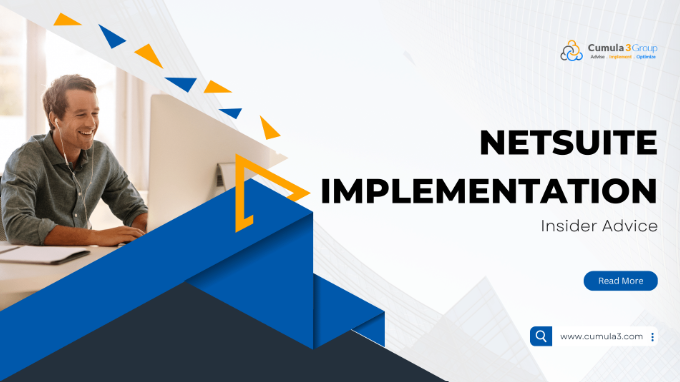By Kevin Ovalle, Vice President of Anderson Frank.
It’s sometimes hard to get beyond the sales pitches when looking at implementing a new ERP or CRM solution for your business. Unless you already use it, then you’ll have almost certainly have considered NetSuite. It’s one of the global giants and brings with it the benefit of being entirely cloud-based.
Getting a straight answer to which solution is best for your business can be difficult though, so asking for opinions from those working within the technology itself can be invaluable. Our recent study of professionals who work with NetSuite has done just that, giving a great insight into the implementation process itself.
One of the most encouraging things to come from the survey is that those who’ve adopted the solution cited lofty rates of user satisfaction. When asked about the main consideration ahead of making a switch from their current ERP/CRM provider, 68% of respondents cited functionality as key, and those currently using NetSuite regarded the platform’s features highly.
Any business considering implementing NetSuite will be happy to see that adopters are seeing the promises that prompted the change paying off afterwards. Streamlined business operations, improved work processes and better efficiency were cited by respondents as primary advantages of using NetSuite. Rounding out the top five benefits brought by the system were improved reporting and access to cloud-based features.
With most involved in cloud-based solutions hailing it as the future of technology, it’s interesting to see that this has filtered down and been backed by those working “hands on” with SaaS platforms. Statistics about better uptime and improved security seem almost irrelevant unless it has the buy-in from users, which definitely seems to be the case for NetSuite.
It’s great to see that level of satisfaction with the product, but it’s also worth looking at where these migrations are coming from. This information will give you a better understanding of whether or not NetSuite may be the solution for your organization, and if your current set-up is a good starting point to consider a new platform to run your business.
For those using NetSuite primarily as an ERP, 39% of migrations came from QuickBooks. The biggest change climb in migrations to NetSuite came from Sage, with 10% of those moving to NetSuite migrating from the accounting software compared to last year’s 6%. Migrations from Microsoft Dynamics (also 6%) completed the top three.
CRM users haven’t seen as big a change this year, with the top three staying the same. Salesforce remains way out in front, with 25% of migrations coming from Salesforce products. Microsoft Dynamics CRM (12%) and SAP CRM (4%) were the other platforms seeing the most user migrations to NetSuite.
This year was also the first time that the community was asked about NetSuite’s eCommerce software—27% and 12% of respondents said they had switched to eCommerce from Magento and Shopify respectively, and a further 4% migrated from WooCommerce.
If you’re thinking about implementing NetSuite, you’ll also need to consider your NetSuite team, and what qualifications you need to look out for to ensure you have the best talent in your corner. One thing the survey highlights is the increasing uptake of NetSuite Certifications.
The prevalence of official certifications within the professional community is something that the NetSuite ecosystem has trailed behind on in the past, compared to communities like Microsoft and Salesforce where certifications are more commonplace. However, it seems that NetSuite professionals are investing more time and money into earning qualifications to make them more in-demand than ever.
This year, 68% of survey respondents held at least one NetSuite certification, a 66% increase on last year. Half of those certified reported a direct increase in their salary as a result, with 76% saying that their employer had paid for their certifications in full. As they’re becoming more widespread, it’s definitely worth looking into what certifications would be most valuable to your business as part of the decision-making process.
You’ll also need to make sure you’re aware of the task you’ll be facing if you decide to implement NetSuite. While you may be keen to start seeing a return on your investment immediately, the overwhelming advice is to prepare properly.
You may see claims that migration can take as little as 45 days, however those taking part in the survey—who have worked directly with implementations first-hand—say that a typical implementation lasts around four to six months.
The main reasons for delays experienced by businesses implementing NetSuite were poor planning, unforeseen customizations, and issues with data migration. Essentially, once you’ve chosen your solution, as much work needs to go into planning and preparing as you put into the move itself.
Whether you have an in-house team doing most or all of the work, or are using an implementation partner, it’s vital that you take each step carefully. Rushing it could result in having an incomplete dataset, and either having to clean it again or trying to create workarounds that will hamper your solution’s efficiency in the long term, as new updates are released that could potentially overwrite your fixes.
There’s much to consider ahead of choosing NetSuite as your new CRM or ERP platform, but thankfully there are plenty of resources that can assist you with a successful implementation, whether that’s using a partner to help you or simply doing your research and hearing from those already working with it.
Implementation success starts with the right prep. Explore tailored NetSuite pricing and proven guidance from Cumula 3 Group.







